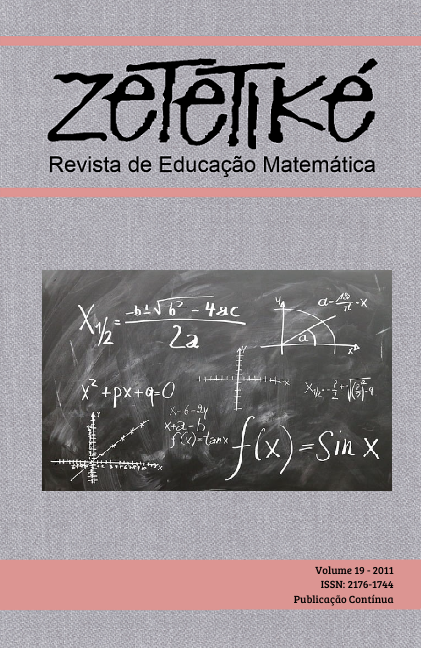Abstract
This study addressed the phenomenon of Indigenous Times Markers as a sociocultural
event, from the look of indigenous teachers from different ethnia of Mato Grosso, students of
the Indigenous Intercultural Faculty of Unemat. This phenomenon reveals itself as an example
of extraordinary knowledge that indigenous societies have of themselves and of the territories
they inhabit, in a reciprocal relationship between the people and between these people and the
environment, which brings the possibility of a scientifi c production impregnated and legitimized by them, which has as purpose and as condition to validate it, the environmental and
social welfare. The time, characterized as resulting from the construction and expression of the
lifestyles of one society, is designed from the “mathematical knowledge” and from the answers
the needs of theoric and spiritual transcendence of human beings. The mathematical knowledge
in the Ethnomathematics Program´s perspective (D’AMBROSIO, 2002) pervades this dynamic of relationships and accommodates in its fundamentals the understanding that environment
and society are part of a single and indivisible body of research on the knowledge produced by
distinct cultural groups, as well as about the dynamic process of production, intellectual and
social organization, and dissemination of this knowledge, besides the processes of adaptation and
re-elaboration that accompany it.
References
BRANDÃO, C. R. Somos as águas. Campinas, SP: Papirus, 1994.
D’AMBROSIO, U. Etnomatemática. Arte ou técnica de explicar e conhecer. São Paulo: Ática, 1990.
D’AMBROSIO, U. Etnomatemática: um programa. Educação Matemática em Revista – SBEM, Blumenau, n. 1, p. 5-11, 1993.
D’AMBROSIO, U. Etnomatemática – elo entre as tradições e a modernidade. Belo Horizonte: Autêntica, 2002.
ELIAS, N. Sobre o tempo. Rio de Janeiro: Jorge Zahar, 1998.
FERREIRA, M. K. L. (Org.). Ideias matemáticas de povos culturalmente distintos. São Paulo: Global, 2002.
GEERTZ, C. O saber local. Trad. Vera Mello Joscelyne. Petrópolis: Vozes, 1998. GOUREVITCH, A. Y. O tempo como problema de história cultural. In: RICOEUR, P. (Org.). As culturas e o tempo. São Paulo: EDUSP, 1975.
JANUÁRIO, E. Formação de professores indígenas em serviço: a etapa de estudos cooperados de ensino e pesquisa – intermediária. Cadernos de Educação Escolar Indígena. — Projeto de Formação de Professores Indígenas/ 3º Grau Indígena, UNEMAT, Barra do Bugres, MT, v. 2, n. 1, p. 56-65, 2003.
KNIJNIK, G. Exclusão e resistência. Educação Matemática e legitimidade cultural. Porto Alegre: Artes Médicas, 1996.
LEFF, E. Saber ambiental. Sustentabilidade, racionalidade, complexidade, poder. 2. ed. Petrópolis, RJ: Vozes; PNUMA, 2002.
LIMA, S. Mosaico de interculturalidade no Programa de Educação Superior Indígena Intercultural: aspectos sobre o direito. Dissertação (Mestrado) — Programa de Pós-Graduação em Ciências Ambientais, Universidade do Estado do Mato Grosso, Cáceres, MT, 2009.
LINHART, J. Universidades indígenas - programas de Educação Indígena Superior na América Latina: a caminho de uma ciência intercultural? Dissertação (Mestrado) — Universidade de Munique, Munique, Alemanha, 2007. 230p.
MELO, E. A. S. Povos indígenas, identidade e escrita: constituição de uma autoria acadêmica. Tese (Doutorado) — Instituto de Estudos da Linguagem, Unicamp, Campinas, 2009. 164p.
SANTOS, B. de S. (Org.). Semear outras soluções: os caminhos da biodiversidade e dos conhecimentos rivais. Rio de Janeiro: Civilização Brasileira, 2005.
SANTOS, B. de S. Para além do pensamento abissal: das linhas globais a uma ecologia de saberes. Revista Crítica de Ciências Sociais, Coimbra, n.78, p.3-46, out. 2007.
SCANDIUZZI, P. P. Educação matemática indígena: a constituição do ser entre os saberes e fazeres. In: BICUDO, M. A. V.; BORBA, M. de C. (Org.). Educação matemática pesquisa em movimento. São Paulo, SP: Cortez, 2004.
SEBASTIANI FERREIRA, E. Por uma teoria de Etnomatemática. Bolema, Rio Claro, n. 7, p. 30-35, 1991.
SEVERINO FILHO, J. Marcadores de tempo indígenas: educação ambiental e etnomatemática. Dissertação (Mestrado) — Programa de Pós-Graduação em Ciências Ambientais, Universidade Estado do Mato Grosso, Cáceres, 2010. 160p.
SILVA, L. P. da. Arqueologia e Ensino Superior indígena: uma experiência na Universidade do Estado de Mato Grosso, Campus de Barra do Bugres. Dissertação (Mestrado) — Universidade Federal da Grande Dourados, Dourados, MS, 2007. 290p.

This work is licensed under a Creative Commons Attribution-NonCommercial-NoDerivatives 4.0 International License.
Copyright (c) 2014 Zetetiké: Revista de Educação Matemática

